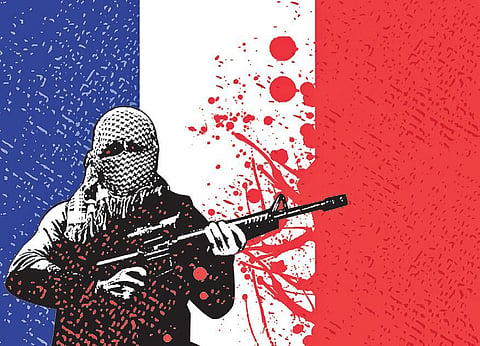

The spate of terror attacks in Europe, first in France and now spreading to Austria, has reopened the old war between the European idea of secularism and Islamic fanaticism. France and its President have become hated figures among Islamic countries. Turkey and Pakistan—the two countries who have been competing and co-operating to become the leaders of the Islamic world—have reacted most shrilly.
The Arabian leaders, including Saudi Arabia, were at the forefront condemning the terror attack, while the reaction of Turkey and Pakistan was not against the terrorist but against the victim of terror, France. Though India has rightfully stood with France, as it should, there are protests on our streets too against France. From Turkey to Malaysia, thousands are marching against their new villain: France.
The irony is that there are hardly any protests or condemnation against an autocracy like China which uses brute force against its minorities. China scholar Adrian Zenz reported about the Muslim women being force-sterilised by Communist China to bring down numbers of the Muslim Uyghurs of Xinjiang. Anyone resisting is sent to ‘re-education camps’. BBC reports that China was separating children from their families, so they could grow up without understanding Islam.
Those who rage on the streets against third rate cartoons stay silent against a humanitarian crisis. Neither Turkey nor Pakistan dares to raise a voice against China. Western countries, or for that matter, India, which has a modern democratic Constitution, are softer targets. The hypocrisy would have been comical, if not for the human tragedy.
France holds on to its secular values fanatically. It has no place for religion in the public sphere. The French revolution put an end to a monarch with divine rights. It relinquished its position as ‘the eldest daughter of the church’. As early as 1790, the Civil Constitution of the Clergy introduced an initial severance from Church and nationalised all Church properties. This was a giant leap for a country that was at the forefront of Crusades during the dark ages. Modern values of democracy, secularism and free speech owe a lot to the European renaissance.
Europe woke up from an era of darkness and shook away the shackles of the Church during this period and has been reaping the benefits of the same for the past three centuries. Though France has had its share of horror in colonial history, it had always treated its citizens as equal with no discrimination based on religion. It was the same liberal values that the refugees fleeing the strife-torn Islamic countries took advantage of. Countries like Turkey or Pakistan were neither large-hearted enough to accept their brethren in distress nor were such countries a preferred destination.
The problem arises when the value systems of the asylum-seekers and the hosts clash. As the world progresses and science advances, it will render many beliefs and religious texts redundant. The societies that accept that every form of human knowledge, including religion, needs a constant update will progress and build a more humane and equitable society. Those who hang on to the old ways are cursed to be stuck in medieval rut.
The asylum-seekers knew that they had come to a country with different values and are happy to enjoy all the perks of modern society. They are aware that one of the pillars of the French Constitution is the Right to Free Speech; however distasteful and offensive the speech may be. The cartoons are in bad taste and are deliberately provocative, but that is no reason to kill. The answer to a provocative cartoon or writing could only be through the same medium and not with bullets or knives. We can condemn a cartoon or book or film we do not like, boycott it, run a campaign against it, reason against it, draw counter cartoons or mock back—all those are our democratic rights.
After using violence, one cannot hide behind the victim card or accuse the world of having phobia against those who use terror. If anyone uses terror to drive a point, the victims have, at the least, the right to fear perpetrators of such crimes. The moment anyone resorts to violence, the other side also will answer with violence, and it becomes a vicious cycle. There can be no ‘buts’ and ‘however’, in condemning violence. There is no need to patronise anyone who rages for blood.
There is a need to strengthen the liberal and progressive voices in any society and it cannot be achieved by applying special rules for some cultures. Being afraid to call out such violence will only encourage the fanatics, who feed on each other’s propensity to react with aggression against anything they define as provocative. Religious fanaticism has killed more people than epidemics or narcotic drugs.
Anand Neelakantan
Author of Asura, Ajaya series, Vanara and Bahubali trilogy mail@asura.co.in